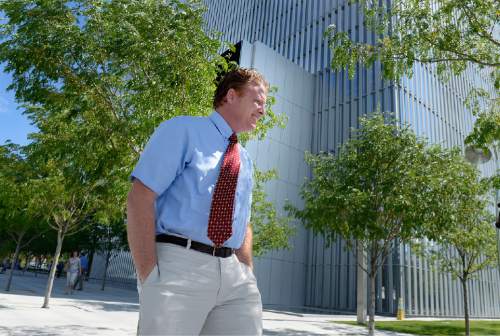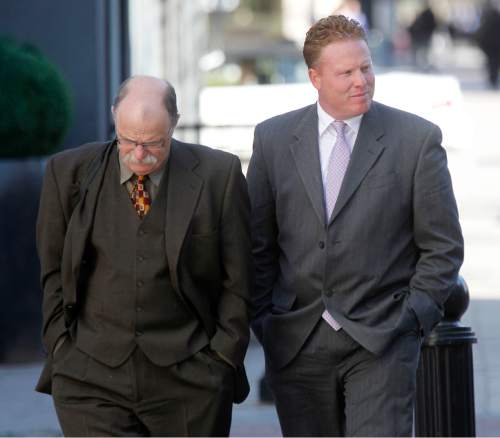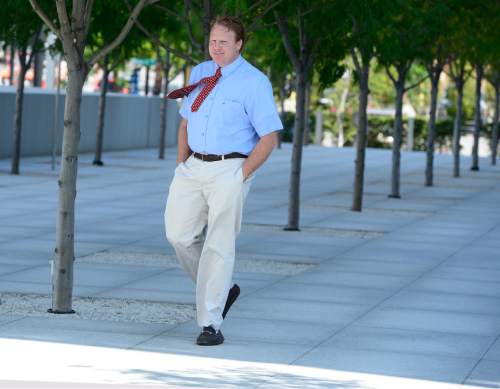This is an archived article that was published on sltrib.com in 2015, and information in the article may be outdated. It is provided only for personal research purposes and may not be reprinted.
A prosecution team that intercepted some 4,000 emails between indicted St. George businessman Jeremy Johnson and his attorneys failed to follow standard federal law enforcement procedures, two former federal prosecutors say.
Prudence as well as the circumstances of the search warrant that obtained Johnson's emails, the two argue, practically require institution of a so-called taint team to filter out any communication between lawyers and their clients that prosecutors are not supposed to access.
"The reason, as a U.S. attorney's office, that you want to be hyper-vigilant in this regard is you don't want to create potential arguments that you've done something wrong," said Brett Tolman, a former U.S. attorney for Utah who is now a defense lawyer in private practice.
But questions have arisen about how the U.S. attorney's office has handled the emails between Johnson and his lawyers and those of at least one other defendant in the criminal case involving 86 charges related to alleged bank fraud.
Johnson's attorneys, Rebecca and Greg Skordas, have filed a motion seeking evidence about how the emails were handled.
A judge will hold a hearing on the issue on Oct. 1.
Attorney Marcus Mumford, who represents defendant Scott Leavitt, has tried unsuccessfully to gain admittance to the hearing because he says some of his client's emails also were intercepted.
Johnson was first charged in June 2011 with a single count of mail fraud related to operation of his online marketing company called I Works, which also is the subject of a civil suit filed in December 2010 by the Federal Trade Commission.
The May 17, 2013, warrant to seize Johnson's emails was unsealed last week at the request of federal prosecutors. The warrant and two attachments show it targeted Johnson's Gmail accounts for possible witness tampering involving two people.
Tolman, the chief federal prosecutor in Utah from July 2006 to December 2009, questioned the premise of the email warrant.
"What's really not said here that needs to be said is there's nothing wrong with contacting a witness," Tolman said in an interview. "That's not obstruction. That's not witness tampering, whether he does it himself or whether his lawyer does."
Johnson was not charged with witness tampering but about 4,000 emails between Johnson, Leavitt and attorneys have surfaced as part of a database of documents and other evidence that prosecutors have provided to Johnson's lawyers.
University of Northern Illinois law professor Daniel McConkie, a former California federal prosecutor, said he believes the circumstances called for use of a filter team — also called a taint team — to assure that the prosecution team was walled off from the privileged emails.
"In my office I'd say don't even think about going in there without a filter team," said McConkie, who added that he formerly instructed such teams about how they should operate. "This guy's got multiple pending cases. We know who the attorneys are. It's not going to be easy to explain to a judge that we seized emails from his attorneys."
Johnson and four former top I Works employees face 86 charges from an indictment that came after he and federal prosecutors could not complete a plea bargain. Trial is set to begin Feb. 1. All defendants have pleaded not guilty and all turned down proposed plea bargains.
The "U.S. Attorneys Manual" from the Department of Justice calls lawyer-client privilege "one of the oldest and most sacrosanct privileges under the law."
A "privilege team" of agents and attorneys not involved in the prosecution is called for in cases where a search is conducted of the offices of an attorney who is the subject of an investigation, the manual says, and Tolman and McConkie argue the same standard should apply to the Johnson case.
In a nearly 300-page manual, the Department of Justice's Computer Crime Division says when agents contemplate a search of computer files that may contain attorney-client privilege files, they "should devise a post-seizure strategy for screening out the privileged files and should describe that strategy in the affidavit."
The affidavit accompanying the search warrant for Johnson's emails remains sealed so it's not known publicly whether that instruction was carried out.
The manual also says "a trustworthy third party must examine the computer to determine which files contain privileged material."
The only apparent mention of a taint team in the Johnson criminal case is when a federal agent asked for a warrant in November 2011 to search the electronic devices possessed by Johnson when he was arrested at the Phoenix airport. The IRS agent who sought the warrant told a federal magistrate judge that the actual search would be conducted by a "taint team."
But the 2011 warrant appears to be last time that prosecutors or agents invoked — at least in name — a taint team, and the court record doesn't appear to show such a group ever examined any possible privileged material.
A memo to the court, unsealed last week at the request of the U.S. attorney's office, pointed to a March 2014 court filing on how it was dealing with attorney-client materials. The U.S. attorney's office and defense attorneys are under a gag order from the court.
Prosecutors said they would direct a forensic examiner at the FBI's Intermountain West Regional Computer Forensics Laboratory in Salt Lake City "to sequester any communications related to attorneys," and they pointed to an attached list of names whose communications were to be screened out.
That list, however, also raises questions. The March 2014 court papers say the list was created in conjunction with the Federal Trade Commission. The list contained the names of attorneys associated with Johnson, other defendants and I Works before January 2011, or just after the FTC lawsuit was filed, prosecutors said.
However, it also includes attorneys Ron Yengich, Chelsea Koch and Karra Porter, who were not representing Johnson, his family, or I Works until February 2012.
McConkie said a taint/privilege/filter team would litigate any disputes about whether material was privileged or not, leaving the prosecution team distanced from those issues. Otherwise, said McConkie, who taught law at Brigham Young University for two years, "you're putting a lot of trust" in prosecutors and agents who have personal involvement in the prosecution.
Still, he said, it will be up to the court to decide if the prosecution team's possession of the emails was proper, not in bad faith and not prejudicial to the defense.







